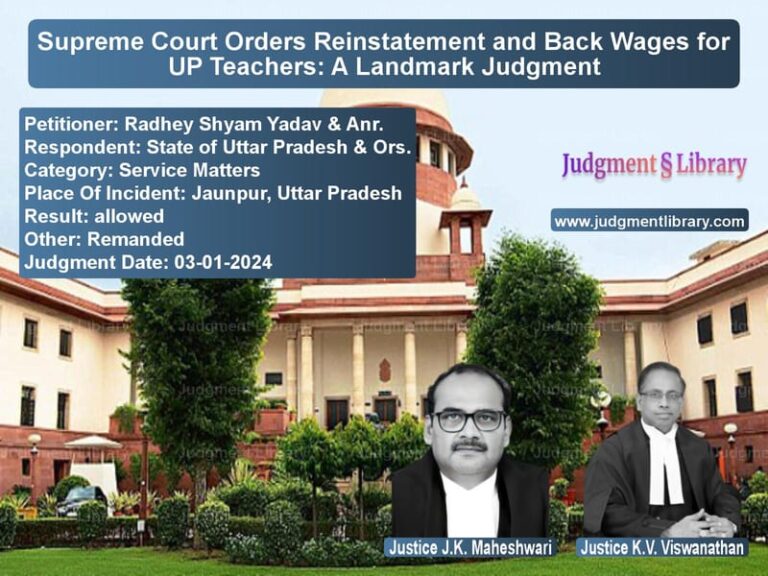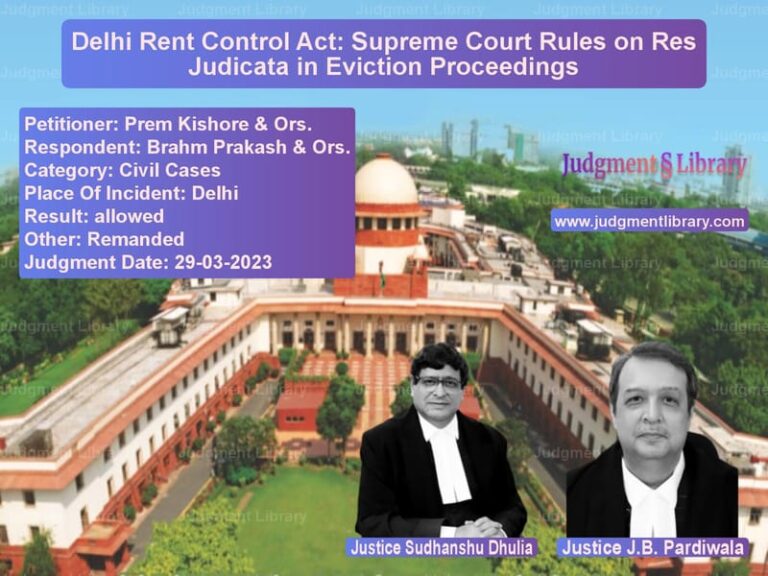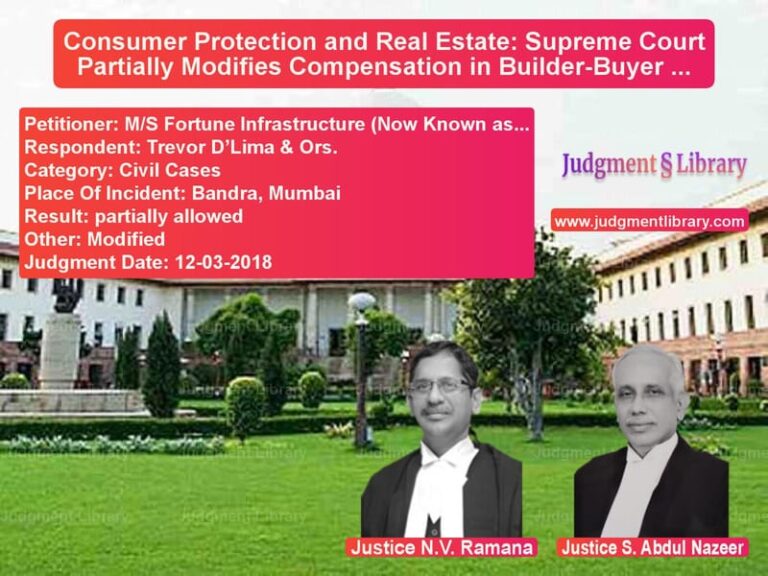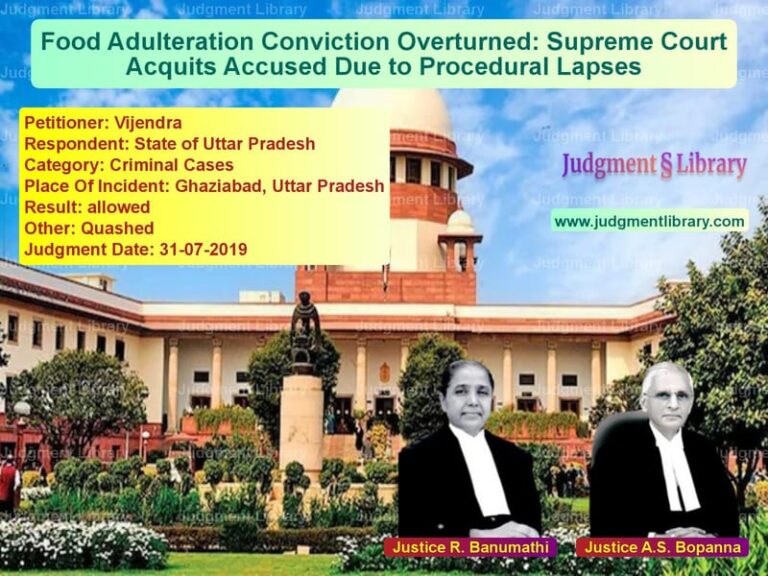Supreme Court Dismisses Thika Tenancy Claim: Landmark Ruling on Property Rights
The Supreme Court has delivered a crucial judgment in the case of Nemai Chandra Kumar (D) Through LRS & Ors. vs. Mani Square Ltd. & Ors., which revolves around the claim of thika tenancy in a disputed property. This ruling clarifies the interpretation of thika tenancy laws in West Bengal, particularly under the Calcutta Thika Tenancy Act, 1949, the Calcutta Thika Tenancy (Acquisition and Regulation) Act, 1981, and the West Bengal Thika Tenancy (Acquisition and Regulation) Act, 2001. The Court has held that the appellants were not thika tenants and that the property in question never vested with the State under these laws.
Background of the Case
The dispute arose from a property at 196, Picnic Garden, Tiljala, originally owned by Laxmi Narayan Ghosh. In 1973, a lease for 20 years was executed in favor of M/s Kumar Industries, represented by Badri Narayan Kumar and Nemai Chandra Kumar. This lease expired in 1993.
In 2003, the lessees applied to the Controller under the Thika Tenancy Act, claiming they were thika tenants and that the land had vested in the State. The Controller ruled in their favor, but the landlord, Mani Square Ltd., challenged this decision before the High Court of Calcutta.
Key Legal Issues
- Were the appellants thika tenants under the Act of 1949, Act of 1981, or Act of 2001?
- Did the land vest in the State under the provisions of these Acts?
- What is the legal impact of the construction of a pucca (permanent) structure on the land?
- Did the previous High Court stay on the Act of 1981 affect the applicability of thika tenancy laws?
Arguments Presented
Petitioner’s (Nemai Chandra Kumar & Ors.) Arguments:
- The Act of 1949 did not exclude tenants with pucca structures, and thus, they should qualify as thika tenants.
- The Amendment Act of 2010 explicitly included pucca structures within the definition of thika tenancy, which should apply retrospectively.
- The land had already vested with the State under the Act of 1981, making them thika tenants.
- They had paid rent under protest, which should confirm their tenancy status.
Respondent’s (Mani Square Ltd.) Arguments:
- The appellants were lessees, not thika tenants, as their lease period was 20 years, exceeding the limit defined in the Act of 1949.
- The presence of a pucca structure excluded them from thika tenancy, as held in multiple High Court rulings.
- The Act of 1981 did not apply to them due to the stay order issued by the High Court.
- Since the lease expired in 1993, the appellants had no legal status as tenants under the Act of 2001.
Supreme Court’s Observations and Ruling
The Supreme Court ruled in favor of Mani Square Ltd., affirming the Calcutta High Court’s decision. The Court’s key findings include:
- The Act of 1949 excluded tenants with lease periods exceeding 12 years. Since the appellants had a 20-year lease, they were not thika tenants.
- As per established High Court rulings, the term “any structure” in the Act of 1949 referred only to kutcha (temporary) structures, not pucca structures.
- The Act of 1981 was under a stay order from the Calcutta High Court concerning this property, preventing any vesting of the land in the State.
- The Amendment Act of 2010, which included pucca structures under thika tenancy, applied only prospectively and not retrospectively.
- By the time the Act of 2001 came into force, the lease had already expired, and the appellants were trespassers rather than tenants.
Key Takeaways from the Judgment
- Thika tenancy applies only to cases where the tenant has constructed kutcha structures.
- The Act of 1949 specifically excluded leases exceeding 12 years.
- Vesting of land under the Act of 1981 does not apply when a High Court stay order is in effect.
- The Amendment Act of 2010 is not retrospective and does not apply to past cases.
- Once a lease expires, the lessee does not retain tenancy rights under thika tenancy laws.
Impact of the Judgment
- This ruling sets a crucial precedent for disputes involving thika tenancy claims and landlord-tenant relationships.
- It reinforces the principle that tenants with pucca structures cannot claim thika tenancy protections.
- The decision protects landlords from frivolous claims of thika tenancy after lease expiry.
- Future litigation on thika tenancy will have to consider the retrospective applicability of legislative amendments.
Conclusion
The Supreme Court’s decision in this case clarifies the limitations of thika tenancy claims and the effect of successive legislative amendments. By dismissing the appellants’ claims, the Court has reinforced the legal standing of landlords while ensuring that tenancy protections are not misused. This ruling will have a lasting impact on future property disputes involving thika tenancy laws in West Bengal.
Petitioner Name: Nemai Chandra Kumar (D) Through LRS & Ors..Respondent Name: Mani Square Ltd. & Ors..Judgment By: Justice A.M. Khanwilkar, Justice Dinesh Maheshwari.Place Of Incident: Kolkata, West Bengal.Judgment Date: 27-07-2022.
Don’t miss out on the full details! Download the complete judgment in PDF format below and gain valuable insights instantly!
Download Judgment: nemai-chandra-kumar-vs-mani-square-ltd.-&-o-supreme-court-of-india-judgment-dated-27-07-2022.pdf
Directly Download Judgment: Directly download this Judgment
See all petitions in Property Disputes
See all petitions in Contract Disputes
See all petitions in Specific Performance
See all petitions in Judgment by A M Khanwilkar
See all petitions in Judgment by Dinesh Maheshwari
See all petitions in dismissed
See all petitions in Quashed
See all petitions in supreme court of India judgments July 2022
See all petitions in 2022 judgments
See all posts in Civil Cases Category
See all allowed petitions in Civil Cases Category
See all Dismissed petitions in Civil Cases Category
See all partially allowed petitions in Civil Cases Category







